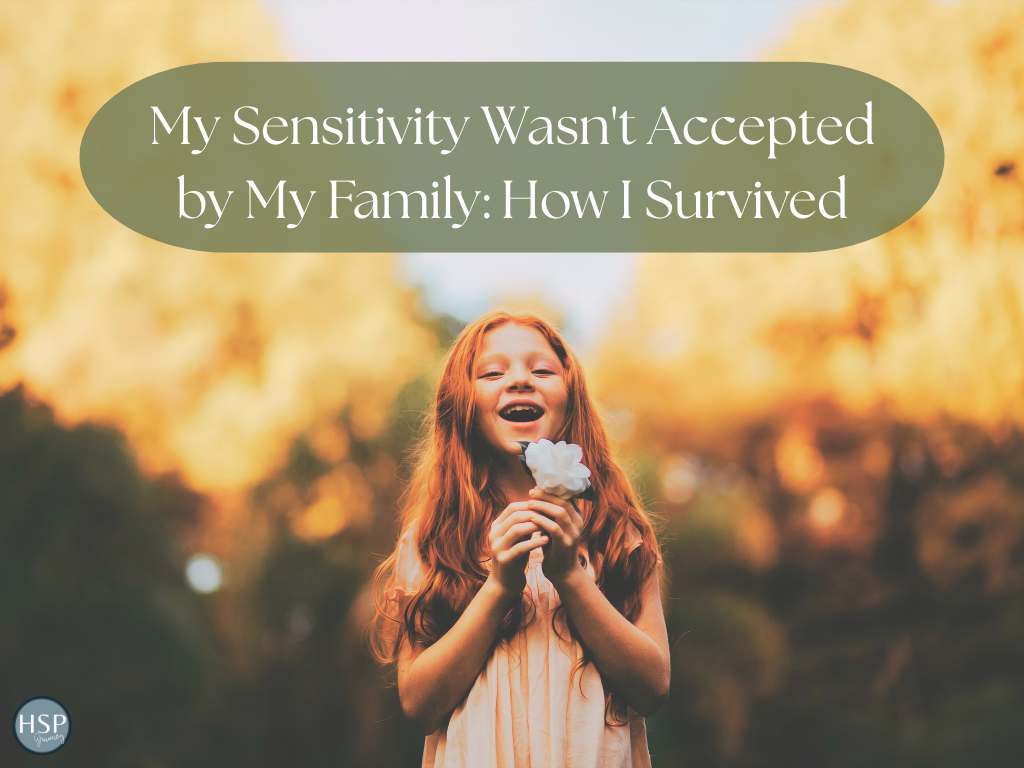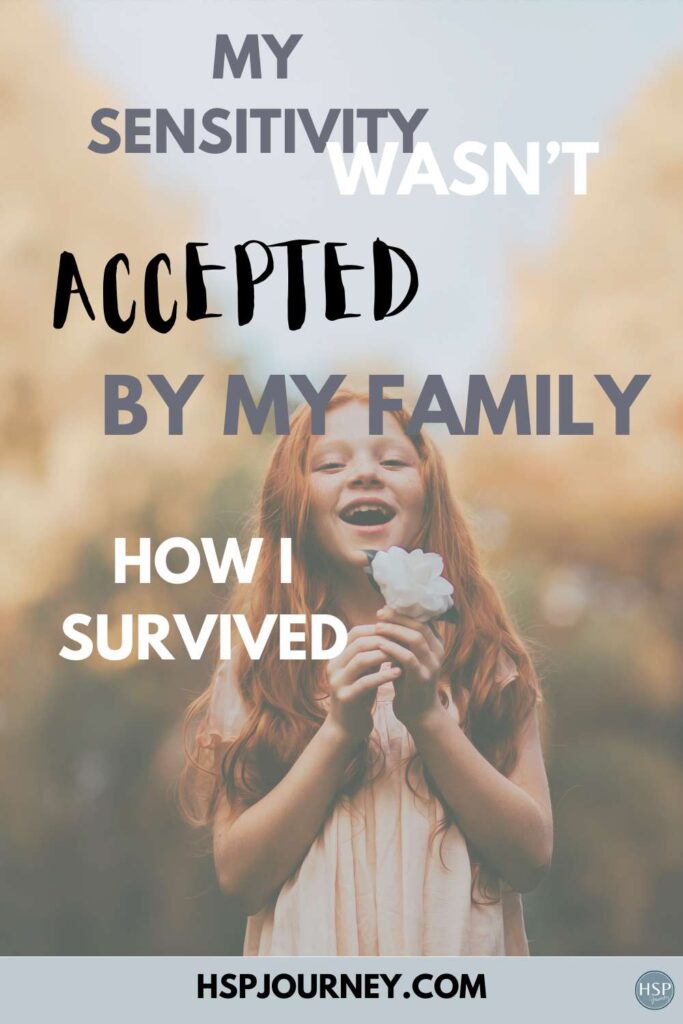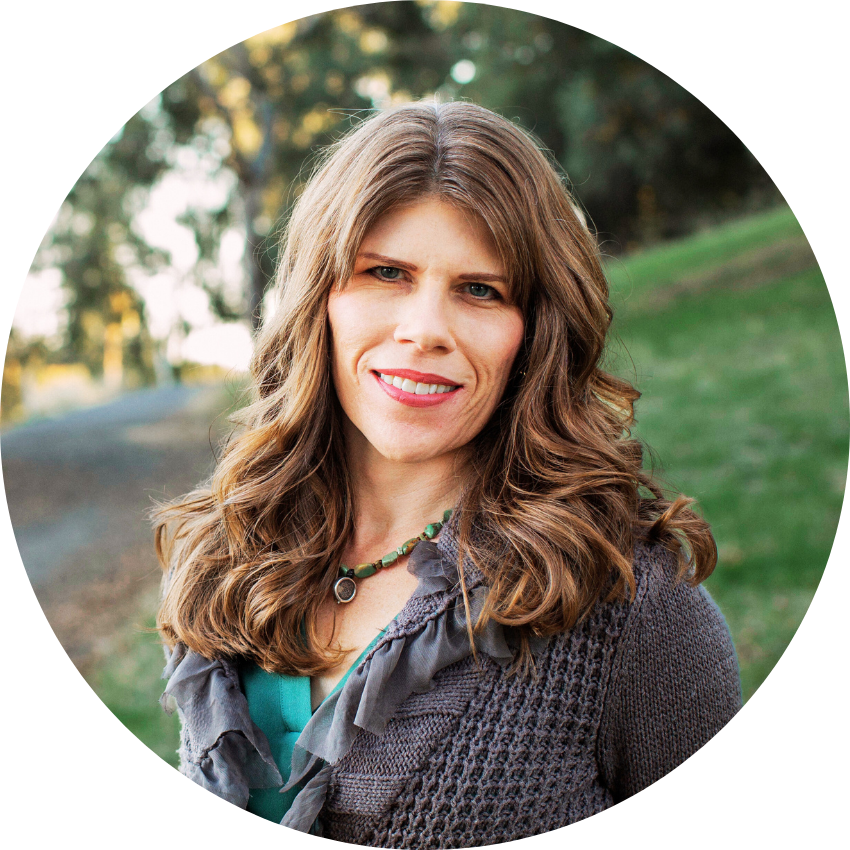In a lot of ways, I had a pretty typical Gen X childhood: being outside until the streetlights came on, left to my own devices with the rest of the neighborhood kids. Parents didn’t talk about feelings—their own or those of their children. We were largely expected to solve our own problems and do what needed to be done without discussion or a lot of adult intervention. It’s not that we raised ourselves as Gen X kids, but in some ways, we did.
No one had a name for high sensitivity when I was a child or adolescent. I was just an odd kid, the one who was always moody, who made a big deal and overthought things, who cried too easily, especially when a person or an animal was suffering. My peers mostly looked away when I was “having a moment.” My parents told me to suck it up (literally!) and wondered when I’d outgrow these behaviors that embarrassed and annoyed them. It was clear–my sensitivity wasn’t accepted by my family.
It wasn’t an easy thing to experience, and I shared other people’s belief that there was something wrong with me. I tried to stifle my sensitivity, go with the flow, and be tough, but it was always a façade. Inside, I was a sensitive, aching soul, wondering why it was so hard to get through life.
Yet somehow, despite the struggles, I got through it. I avoided the addictions and persistent mental health issues that so many of my peers succumbed to. It was probably a lot of luck, but as I look back on my youth, I see some of the factors that helped me get by as a sensitive kid until I could start to do more for myself as a sensitive adult. I wonder if you recognize any of these factors in your own life?

Table of Contents
Surviving as a Child
Connecting with Kindred Spirits
The idea that it takes a village to raise a child has benefits for both parents and children. Parents aren’t expected to be everything to their children, and children get to benefit from a diverse community that is invested in their growth and well-being. For me, that meant connecting with teachers and neighbors who appreciated my sensitivity, nurtured my uniqueness, and modeled different ways that adults can respond to a child’s big feelings and deep thoughts.
I wasn’t part of the popular crowd as a kid, and that was probably the best thing for my sensitivity. My small group of friends included other kids who were introverted, gentle, and, I now suspect, probably sensitive. Doing what I could to stay out of mean girl dynamics and cut-throat academic competitiveness made adolescence more tolerable.
Finding Advocates
Fortunately, some of the adults who “got me” became advocates for me. I still recall my third-grade teacher assuring my mother in front of me that my tendency to cry was not a problem or a sign that I was immature, just part of how I expressed myself. And my high school advisor helped me figure out how to explain to family and other teachers how important writing was to me and why I was applying to go to a poetry camp. Having adults who could translate to other adults what I wanted and needed truly enhanced my sense of self.
Imperfect Engagement with My Interests
Finally, I was able to support my own sensitivity as a kid by engaging in activities that interested me. Even if the adults in my life weren’t fully supportive, no one stood in the way of me journaling, writing poetry, reading, or exploring the woods and fields around me. When I’d hide in my bedroom, which I now recognize as a way I tried to regulate my nervous system, they’d dismiss it as typical teen moodiness and leave me alone. These ways of engaging my interests, even if they weren’t perfectly aligned with what I wanted to do, helped me learn some ways to self-regulate and feed my sensitive soul.

Surviving and Thriving as an Adult
Learning about High Sensitivity
I was in my early 20s when Elaine Aron published her first book on HSPs. I didn’t encounter it until I was in my late 20s, but when I did, the lightbulb came on and I knew there was finally something that described me. Since that time, staying informed about the research on high sensitivity has helped me move from simply recognizing that there are other people like me to embracing the fact that I have a lifelong trait that comes with both benefits and challenges.
Connection with other HSPs and HSTs
Being part of a community of highly sensitive people and therapists (HSTs) has been an amazing part of my adult life. In addition to connecting with people around the world via social media and conferences, I’ve created group offerings to bring HSPs and HSTs together because I enjoy these connections. There is something incredibly comforting to me about knowing that I don’t have to explain my sensitivity to people or try to convince them that it’s real and not a sign of pathology or weakness.
Getting Therapy, Coaching, and Professional Consultations Specifically for HSPs
Working with coaches, consultants, and therapists with expertise in high sensitivity, some of whom are HSPs themselves, has been a powerful experience. I’ve felt tremendous relief and comfort in knowing that the people who are supporting me personally and professionally deeply understand and appreciate the ways that my life is not like the other 70-80% of the population. It’s so much easier to get to the heart of what changes to make when I’m not wasting time explaining to someone why I want or need certain things as a sensitive person.

Looking for an HSP-Trained coach to help you align your life with your priorities?
Through my Highly Sensitive Person (HSP) certification with the Nickerson Institute, as well as being an HSP, I offer HSP coaching to develop specific goals around your HSP needs. We HSPs frequently deal with anxiety and overstimulated nervous systems that prevent us from achieving peace and attaining our life goals. HSP coaching with me includes a detailed review of your sensitivities and a mutually-desired plan for growth and management of this superpower to shift negativity and begin seeing yourself as the hero of your own story. (Affordable monthly coaching begins at $150/month.)
Radical Acceptance of My Parents
My parents never believed the high sensitivity is “a thing” and, even if they had, they wouldn’t have seen it as a good thing, or even as something neutral and descriptive about me. I’ll admit that it makes me very sad that they didn’t see me and my life’s work differently. But I continue to work toward radical acceptance of who they were and how they saw me. Radical acceptance means acknowledging the truth of the situation, even though I don’t condone it, and I wouldn’t choose it for myself. I feel a grief in knowing that both my parents died without accepting me as a sensitive person, but I work to heal that grief, since not accepting them only hurts me now.
Unapologetically Embracing My Sensitivity
As an adult, I get to make the choice to accept my high sensitivity as a fundamental, permanent part of me. It’s a privilege to know about my sensitivity and build a lifestyle that supports it. I have the freedom to make choices that move my work, marriage, friendships, hobbies, and self-care into better alignment with my sensitivity. Even though not everything about my life perfectly meets my needs as an HSP, the more I make the changes that are within my control, the easier it is to manage overall. And that helps me move toward radical acceptance for being highly sensitive.
No matter what your experiences as a highly sensitive child and adolescent were, the beauty of adulthood is that we get to continue to write our stories. We can seek out people, situations, and a relationship with ourselves that honors our sensitivity and allows us to thrive. If you’d like to discuss how to do that in your life, please get in touch.
Be sensitive, be free
*This post contains affiliate links and I will be compensated if you make a purchase after clicking on my links*




